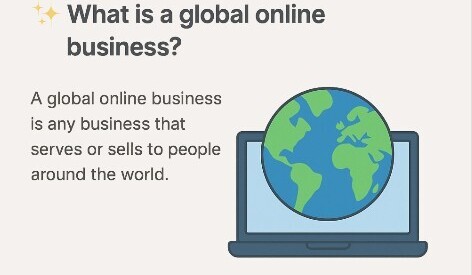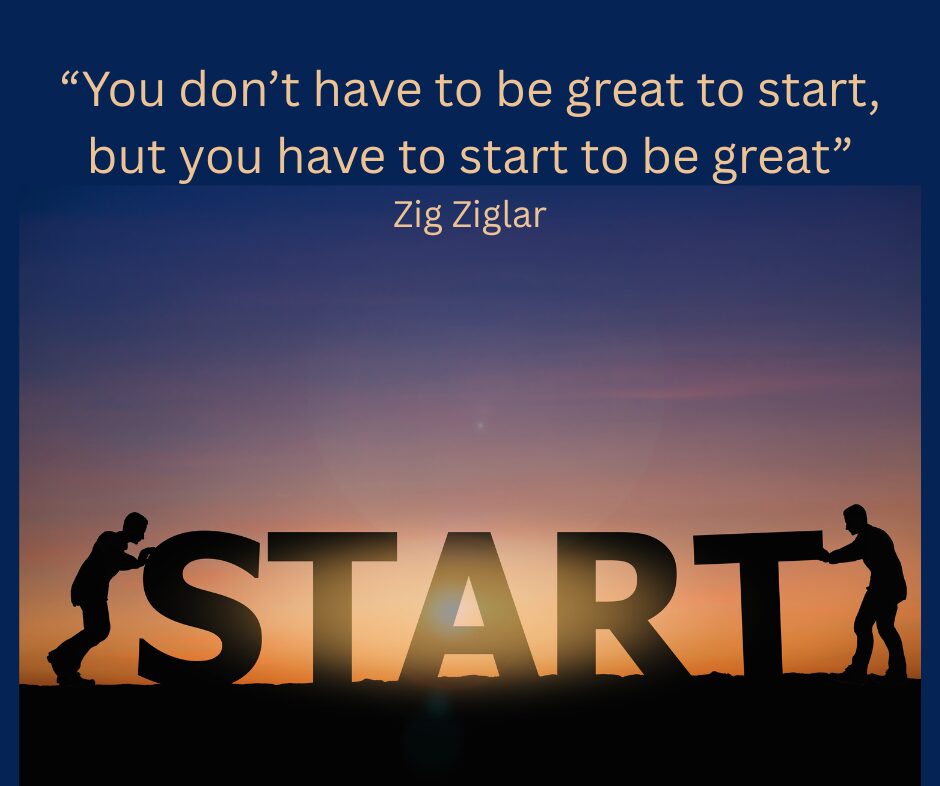There’s something magical about building a business from your kitchen table or your sofa and knowing someone on the other side of the world might learn something new or buy from you while you sleep. That’s the beauty of a global online business, and it’s more achievable than you might think.
In this post, I’ll walk you through what it really means to go global, the tools that can make it possible, as well as how you can start reaching international customers – even if you’re just getting started.
What is a global online business?
A global online business is any business that serves or sells to people around the world. You don’t need a huge team, offices in different countries, or a shipping department as you might have done with traditional businesses in the past. In fact, many successful online entrepreneurs start solo – from home – with a laptop, a plan, and a bit of courage.
If you’re offering digital products, affiliate links, services, or coaching that can be delivered remotely – you already have the potential to go global.

This article contains affiliate links. For more information, see our Affiliate Disclosure.
Why global? The benefits of thinking big
Here are just a few reasons to expand your vision beyond local borders:
- Larger audience – You’re not limited to your town or even your country. There are billions of potential customers online
- More opportunities to earn – someone in Canada might love your digital planner just as much as someone in Cornwall
- Time zone magic – Your business can work for you while you sleep
- Reduced risk – A wider audience base means you’re not dependent on one region and the problems that can arise if that is disrupted
And here’s the big one: It doesn’t cost more to reach more people. The internet is already built to connect us globally. You just need to plug in.

Tools to run a global online business
You don’t need fancy tech or a massive budget. Here are a few tools and platforms to help you get started:
✅ A website that reaches the world
Your website is your digital shopfront. Make sure it accepts international payments using tools like PayPal, Stripe, or platforms like Shopify, Gumroad, or Podia.
✅ Email marketing tools
Platforms such as MailerLite, Kit, or Flodesk help you build a list of subscribers from around the world – and stay in touch with them automatically.
✅ Social media platforms
Instagram, Facebook, LinkedIn, YouTube, and Pinterest are global by nature. One strong reel or post can travel further than you ever will.
👉 Check out my guide to Facebook and Instagram Reels and Stories here
✅ Affiliate networks
If you’re into affiliate marketing, platforms like Wealthy Affiliate, ShareASale, and Impact offer global earning potential.
Real-world examples: big things start small
You don’t need a skyscraper office to go global. You just need to get started. Here are some real stories that prove it:
Candle Shack – From kitchen hobby to £13 million business
Duncan and Cheryl MacLean began making candles in their kitchen in Falkirk. They started selling at local markets, then online. Today, they run a thriving international candle supply business worth over £13 million.
(source: The Sun)
CoolTowel – Teen’s side hustle goes global
Harrison Nott started selling cooling towels from his bedroom at just 15. Using TikTok and a Shopify site, he fulfilled 15,000 orders in one day and is now projected to earn over £100k – all while still in school.
(source: Scottish Sun)
Vinted – From small idea to £4 billion global resale app
Vinted began as a simple platform for cleaning out wardrobes. It now serves millions of users across Europe and has grown into a company valued at over £4 billion.
(source: The Times)
eSamudaay – Empowering rural businesses in India
In Udupi, India, a platform called eSamudaay helped local street vendors set up online shops using a ‘business-in-a-box’ model. Within two years, over 2,500 entrepreneurs across 8 towns were running small, scalable businesses from carts, homes, and community hubs.
(source: Gooomarket)
Stats that prove the potential
- Over 2.77 billion people shop online worldwide in 2025 – that’s more than one-third of the global population
- Global ecommerce is expected to reach $6.86 trillion by the end of this year
- 52% of consumers now consider international sellers when shopping online
- Around 30% of all businesses operate primarily online – and that number keeps growing
(source: Sellers Commerce, source: Cropink)

Tips for building a globally friendly business
You don’t need to overhaul your business to go global – just make a few intentional choices:
- ✅ Use clear, international-friendly language (skip the heavy slang)
- ✅ Enable multiple currencies if your platform allows
- ✅ Schedule posts and emails to reach different time zones
- ✅ Add global-friendly payment and delivery options
- ✅ Monitor where your traffic is coming from using Google Analytics
👉 Here’s my SEO optimisation checklist to help you get started
How did I start?
I didn’t have a business degree. I didn’t have a big budget. I started exactly where you might be now – curious, cautious, and sitting at my laptop, wondering if this was really possible. What I did know was that I wanted to make a difference in my life, and I have done that time and again.
The turning point for me was finding Wealthy Affiliate. It was more than just a training site – it was a complete support system, and I absolutely LOVE the community of like-minded, business-focused people that I found there. Honestly, the support and energy alone make it worth it on a daily basis.
However, I learned everything from scratch:
- How to set up a website
- What SEO even meant (and how to do it properly)
- How to write blog posts that Google would love
- Which tools I needed (and which ones I really didn’t)
- How to use social media properly
- How to use graphics and video tools like Canva and Lumen 5
- And more recently, how to start using AI tools to help me save time and stay consistent – you even get a FREE AI writing tool if you upgrade at the end of your free lessons
But most of all, I learned that you don’t have to figure it all out on your own. The community, training, and step-by-step approach gave me the confidence to stop overthinking and start doing.
If you’re thinking, “This sounds great but I don’t know where to begin,” then you might want to check out my honest review of Wealthy Affiliate. It’s where I started, and I still use it today.
👉 Honest Review of Wealthy Affiliate 2025
Over to YOU: You don’t need to be huge – you just need to begin
You might be sitting at your kitchen table, still unsure if you’re “ready” – but your future customer might already be online, looking for someone just like you.
Your story, your skills, your style – all of it has value. You don’t need a big brand to start a global online business. You just need to start.
👉 This post on personal branding might help
Start where you are. Use what you have. Share what you know.


This post really opened my eyes to how accessible global online business has become even for someone working from a kitchen table! I loved how you broke it down with real tools and relatable success stories; it made everything feel doable, not just inspiring. The examples were especially motivating (CoolTowel blew my mind!). Just curious—what was the biggest mindset shift you had to make when you decided to think global?
Hi Kavitha. Thanks for your kind comments and I’m very pleased that the article was useful. I think the Cool Towel example is also mind blowing and just shows you what a bit of innovation and blue sky thinking can do. Good for him! Nowadays, the youth have grown up with global culture so I think it is a lot easier for them to relate to some of these concepts that for the older generation sometimes. They are already wired into the global economy so think nothing of it.
To answer your question, I think the biggest mindset shifts that people need for going global are:
1) Get over their ‘imposter syndrome’ and realise that they do have something to say and a story to share that will be interesting to someone out there
2) Getting started, however small – doing something and then building on it. Every business (Cool Towels is a case in point) starts relatively small and then learns and grows and learns and grows. If people can get started and use a reputable company such as Wealthy Affiliate too, then you really can conquer the world – one towel at a time it seems!
Hi Gail,
This was a bold and exciting read — and I mean that in the best way. The idea of starting a global online business from your living room sounds like a dream come true… and also something that many people instinctively roll their eyes at. But I have to say, your approach was refreshingly practical. You didn’t oversell the fantasy — you broke it down into actionable steps that felt real.
I especially appreciated your point about identifying your niche and understanding your target audience. That’s a step so many “overnight success” articles skip entirely, but in my experience, that’s where the entire foundation is laid. If you don’t know who you’re speaking to, your message gets lost in the global noise.
Now, that said — let me play devil’s advocate for a moment (because I think you can take it ????). When you talk about setting up a website, monetizing, and going global, it all sounds smooth — but I’d love to hear more about the actual bumps. What were your own challenges when you started? Did you have moments where it all nearly fell apart? Did you spend too much on the wrong tools before finding your rhythm?
Also, I noticed you didn’t mention much about taxes or legal frameworks. For a truly “global” business, especially if you’re dealing with clients or customers across borders, this gets complicated quickly. Are you planning a follow-up post diving into the more gritty, behind-the-scenes aspects of running an international operation — like compliance, payment gateways that work worldwide, or even simple cultural differences in buyer behavior? That would be gold.
One more thing — and this is just my own experience creeping in — a lot of people get caught in “course-collecting” mode instead of actually launching. They think they need one more tool or one more certification before hitting publish. Have you seen this too? If so, how do you help people cut through that paralysis?
All in all, you’ve written a genuinely motivating article here. You’ve clearly walked the walk, and that’s what gives your words weight. I’d be curious to hear more about how your readers have implemented these steps — maybe share a few success stories? That would really help build trust for the next wave of hopeful entrepreneurs landing on this page via Google.
Thanks again — I’ll be following along and looking forward to the next dose of inspiration (with a side of realism, I hope!)
Have a great day!
Farid.
Hello Farid and thank you so much for your very thoughtful and inspired comment. I’m glad you found it useful and adding something a bit new to the ‘start and online business’ environment. I totally agree that finding your niche and choosing wisely is a fundamental part of an online business and I would go further and say that it is better to be something that you are passionate about. After all, if you hate your day job selling something you’re not interested in, why would you set up an online business selling something your not interested in but just doing it online? You might like my article on: How to find an affiliate marketing niche: Top tips. Of even: How to turn a hobby into extra income.
To answer your questions, there are plenty of times that things have fallen apart for me – I lost my domains, Google changed it’s algorithm and real life gets in the way too. This is what makes online business similar to any other kind of business. You need to keep showing up, putting the hours in, and waiting patiently for the rewards. That’s like any other business startup and everyone needs to know about this when they start. You can find some more advice about that on the post about Progress over Perfection or this post about How to be disciplined in businesswhich talks a lot about the pitfalls and how to avoid them.
You’re right that I haven’t tackled the taxes and legal frameworks as this post is really designed for beginners, and that could be an entire book! However, I think that’s a great idea and I’ll add it to my schedule to research and write.
I like your idea about case studies too and I did put a few into this post. I usually do mention those on my Facebook page every so often as I agree that they can help people starting out to see what’s useful.
I get the course fatigue idea too and would point people to the post about Progress over Perfection. I think we’ve all been there but sometimes you just have to get and start.
Thanks again for your insights and I look forward to continuing the conversation in the future.
All the best
Gail